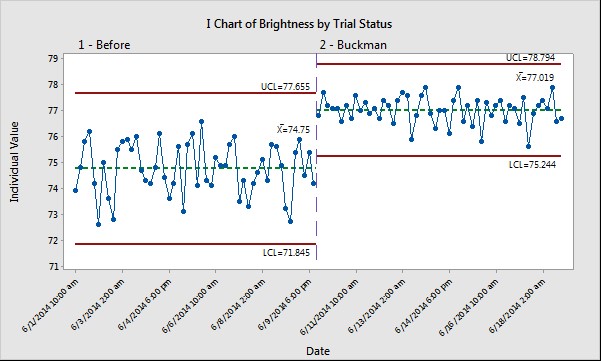While the roots of Lean Six Sigma and other quality improvement methodologies are in manufacturing, it’s interesting to see how other organizational functions and industries apply LSS tools successfully. Quality improvement certainly has moved far beyond the walls of manufacturing plants!
For example, I recently had the opportunity to talk to Drew Mohler, a Lean Six Sigma black belt and senior organizational development consultant at Buckman, about their very unique quality improvement initiative involving the sales function of the organization.
Buckman, a global leader in the chemical industry, does use LSS and statistics to complete internal improvement projects as many organizations do, but they also train their technical sales teams to use LSS and statistical tools to provide more value to customers and thus drive sales.
A ‘Lean’ Deployment of LSS
In many organizations that deploy LSS, statistical tools are taught in either a green or black belt course, as part of a broader tool set that’s framed by the DMAIC methodology, an approach that divides projects into five phases—define, measure, analyze, improve and control.
In these deployments, the use of statistical tools are typically presented in the context of working through an improvement project. Buckman chose a different approach, recognizing that the statistical tools of LSS are useful for any role that analyzes data. If these tools were taught independently from the DMAIC model, they could be taught to a broader audience than just green or black belts.
“We took a Lean approach to the deployment of Lean Six Sigma, realizing that many of our associates who should be using statistical tools would not benefit from the full curriculum of a LSS belt course,” says Mohler. “As we looked at this expanded view, we realized that a key group who should be taught these tools were our sales associates.”
At Buckman, technical field sales associates who have backgrounds in chemistry, biology, or engineering work directly with the company’s customers to help them assess their processes and look for improvement opportunities. Analyzing customer data is a key part of Buckman’s selling process.
“Using Buckman’s chemistry solutions, our technical sales teams work to make our customers’ systems better,” Mohler says. “In essence, they function as process engineers for our customers.”
Mohler and his colleagues developed two separate Lean Six Sigma courses. The first, a yellow belt course, focused on the traditional DMAIC process and the “soft” tools of quality improvement. This is the course Buckman teaches associates who will be leading simple improvement projects. The second course is a data analysis and statistical tools course targeting the organization’s sales associates.
Instead of using the DMAIC framework as the backbone of the statistics training, Buckman took the selling process and linked the appropriate statistical tools to each step. This framework broke the sales flow into more manageable pieces and looked at data analysis activities that are used to:
- Gain knowledge of customer processes
- Plan, run, evaluate and sell new chemical programs
- Manage ongoing chemical programs
- Solve problems within the account
“The end goal is to have our sales associates comfortable using practical statistical tools, so they’ll be able to make better recommendations—data-driven recommendations—to help our customers,” notes Mohler. “We believe that focusing our efforts on improving customer satisfaction will make Buckman more profitable and sustainable.”
In the statistics class, associates are trained on the tools they need for their job activities. Concepts such as control charting, hypothesis testing, capability analysis, and correlation are taught with practical examples that use the data analysis tools in Minitab.
Among the many statistical tools that are covered in the training, associates are taught to visualize their data using various graphs and charts. For example, suppose an associate runs a trial to improve the brightness of paper being produced for one of Buckman’s customers, and collects data both before the trial and during the trial to assess whether their product has made a difference. The staged control chart provides a powerful tool to show the impact that the company’s chemistry had on the process.

Success
Since launching the statistical tools training more than 3 years ago, Buckman has trained more than 500 field sales associates worldwide. And the results are being noticed by other parts of the company.
“Our Research and Development teams are also interested in learning how to leverage Minitab for the data analysis work they routinely do. We are currently developing classes for them which will focus on analysis tools useful for product development and laboratory testing,” Mohler says. “Our corporate mentality has morphed into an approach that empowers everyone within our organization to make data-driven decisions.”
With their field statistics training, sales associates at Buckman are improving their conversion rates—but more important, they are delivering more value for customers.
“Since implementing the field statistics training, we have examples of where we’ve sold new business or protected existing business because of our improved data analysis skills,” notes Mohler. “But what we’ve really seen is increased confidence in our sales associates.
“Because they’ve done the statistical work behind the scenes, they are better prepared to explain the benefits resulting from our products and our customers see us as much more knowledgeable about their systems. This alone makes the training program a success.”
To learn more about how Buckman uses Minitab, check out the full case study: A Positive Reaction: Buckman Mixes Lean Six Sigma and Minitab to Drive Sales
Do you have a unique application of quality improvement tools to share? Tell us in the comments, or share your story with us in a guest post on the Minitab Blog: http://blog.minitab.com/blog/landing-pages/share-your-story-about-minitab/n


